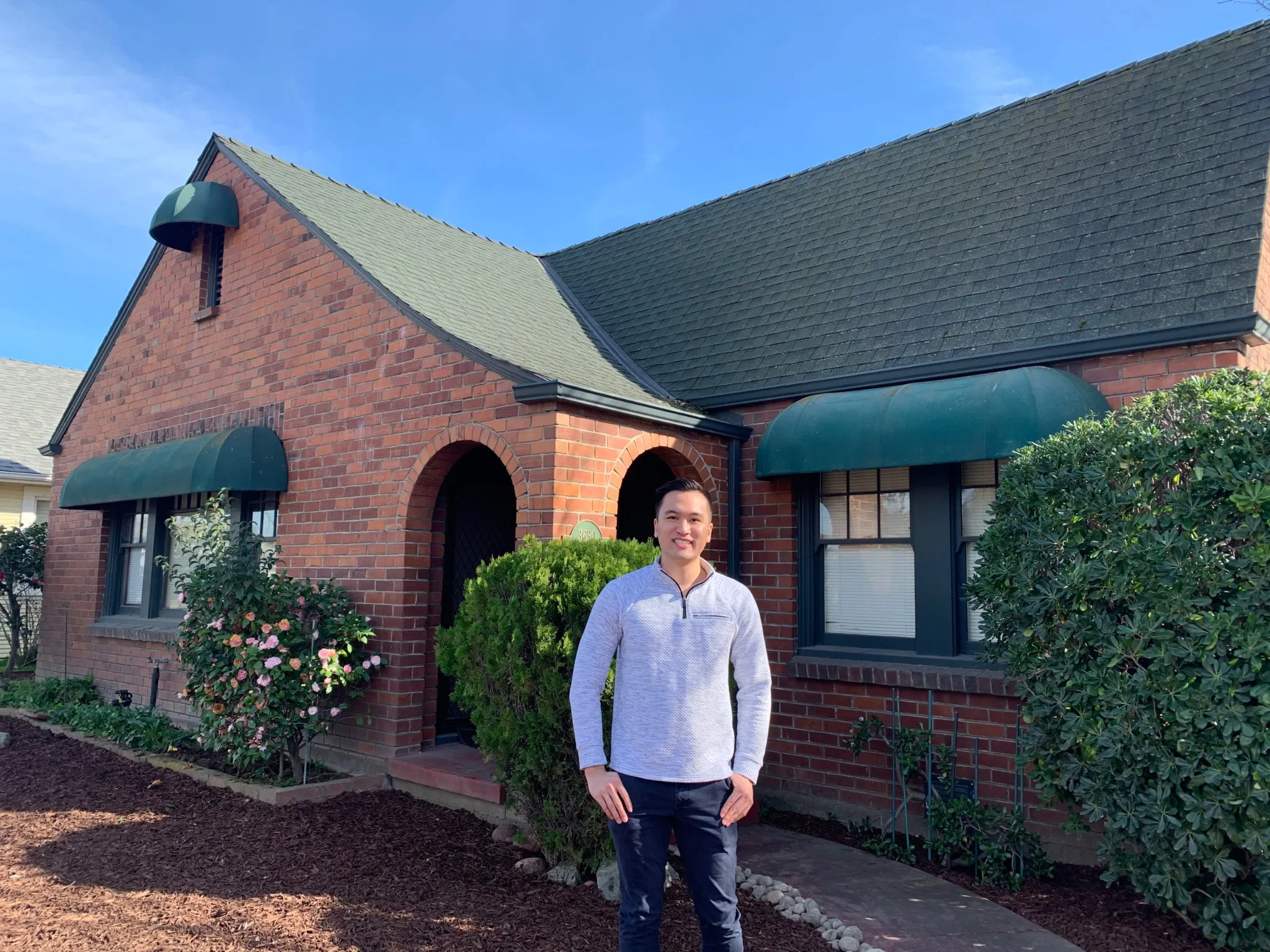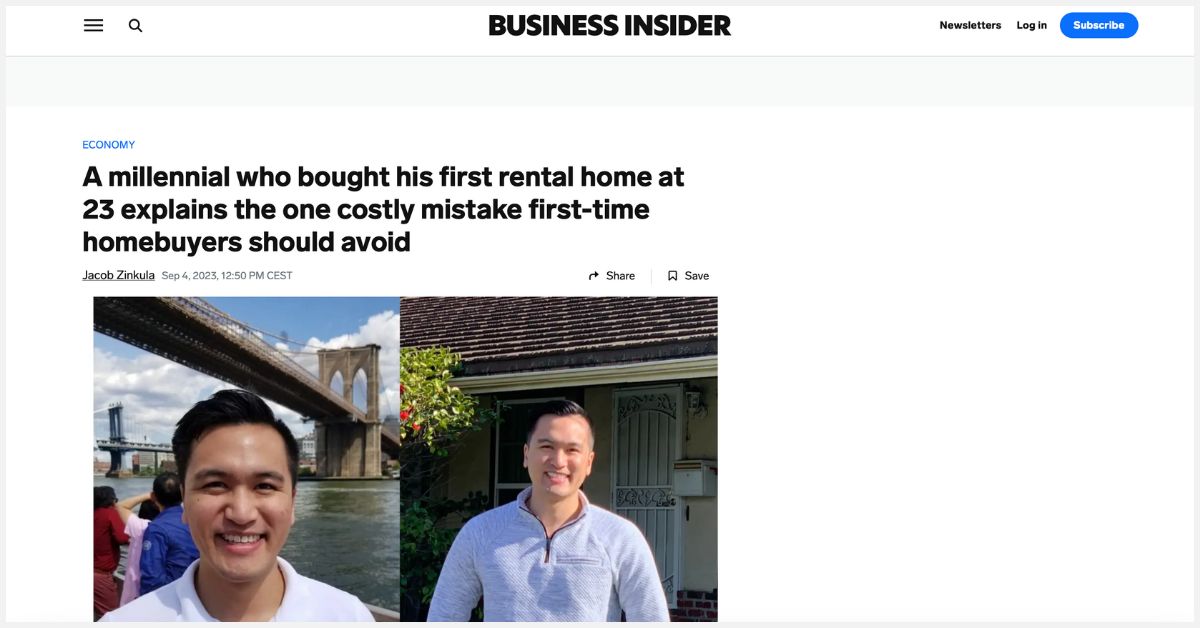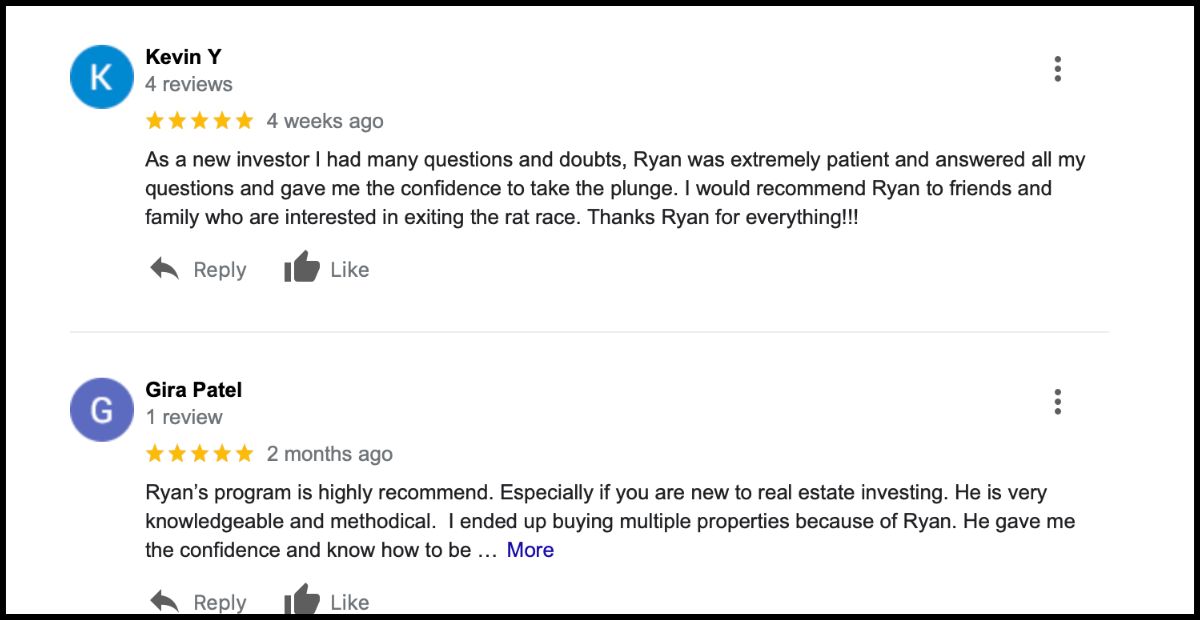Stuck trying to figure out how to get started in real estate – without making costly mistakes?
You’re not alone. Real estate investing can feel overwhelming when you’re trying to go it alone.
That’s why finding the right mentor is one of the smartest moves you can make.
A good real estate investing mentor can help you…
- Break through analysis paralysis
- Avoid expensive rookie errors
- Fast-track your path to your first deal
And in this guide, you’ll learn exactly how to find a mentor, where to look, and the red flags to avoid.
Let’s dive in.
Key takeaways
- The right mentor can save you thousands and years of trial and error. One mistake cost me $30,000 when I started. A mentor helps you avoid those costly lessons, fast-track your first deal, and stay focused on what actually works.
- There are mentors everywhere, but only a few are worth your time. From free connections to paid coaching programs, knowing where to look and what to look for is key. This guide shows you exactly how to find a mentor who aligns with your goals.
- Mentorship only works if you do. Whether it’s a structured coaching program or a casual relationship, your results depend on your mindset, your follow-through, and how coachable you are.
Here’s what we’ll cover…
Table of contents: How to find a real estate investing mentor
- What is a real estate investing mentor?
- Where to find a real estate investing mentor (top 10 places)
- How to choose the right real estate investing mentor
- How to make the most of having a mentor
- How to ask for mentorship (paid or free)
- FAQs about real estate investing mentorship
But first, let’s start by understanding how a real estate investing mentor actually helps you…
What is a real estate investing mentor?
A real estate mentor is an experienced real estate investor who helps you create a strategy for you to succeed in the real estate investment industry. They share advice, guidance, and insights based on their own experience to help mentees navigate real estate investing, including property acquisition, financing, management, and overall success.
In a field like real estate, where one wrong move can cost thousands, this kind of guidance can be the difference between spinning your wheels and building real momentum.
That might be why 97% of people with a mentor say that they are valuable.
I learned that the hard way.
When I bought my first rental property, I didn’t have anyone showing me what to watch out for. I made some painful mistakes, including one that cost me $30,000 and set me back a few years.

This was just one of the issues I encountered…
Looking back, those could have been avoided if I’d had someone more experienced in my corner.
That’s a big part of why I now mentor others—so they don’t have to learn everything the hard way like I did.
Since then, I’ve built a seven-figure portfolio, but the road would’ve been a lot smoother if I’d had the right mentorship early on.

Me in front of one of my properties!
Types of real estate mentors (and which one might be right for you)
There are a few different paths you can take when looking for a mentor. Each has pros and cons depending on your goals, timeline, and how fast you want to move.
1. Paid coaching programs
This option is the fastest path to real results. Coaching programs give you structured support, personalized help, and a clear plan to follow. You’ll know exactly what to do next, and you’ll have someone holding you accountable.
The most common types of paid coaching programs are:
- One-on-one mentorship: This is typically a paid mentorship with a personal mentor. You get tailored help defining your goals and creating a strategy that works for you. You also get the value of one-on-one time with an expert who has been in your shoes. This is the most customized mentorship program for real estate investors.
- Group mentorship: Group mentorship is when you are part of a mastermind consisting of other real estate investors. The groups can vary in size; sometimes there are fewer than 10 people in a group and sometimes there are hundreds of people. The benefit of this type of program is that you can learn from your mentor and the other participants as they go through their investment journeys. It’s also a great opportunity to network with others in your field.
Some real estate investors also offer courses that are self-study programs you take at your own pace.
Best for: Investors who are serious about building a portfolio and don’t want to waste time guessing.
2. Free or organic mentors
You might meet these through networking events, online forums, or local groups. These relationships can be valuable, but they’re usually informal. You’re depending on someone else’s availability and generosity – not a system designed around your success.
Another option are apprenticeships. As an apprentice, you shadow a real estate investor in their day-to-day activities or train with them.
In return, you pay a percentage of your earnings once you start investing on your own. This usually also requires a much larger full time commitment. Many apprenticeship mentors may be picky with whom they choose to take on since they have to devote much more time to it.
Best for: Beginners looking to learn passively or build connections, but not ideal if you want consistent support or a clear timeline.
What a mentor actually helps you with
A great mentor will:
- Help you avoid expensive pitfalls and bad deals
- Share systems and shortcuts that worked for them
- Open doors to trusted lenders, agents, and contractors
- Keep you focused and accountable to your goals
Take my client Kali, who struggled with analysis paralysis for years. After working with me as her mentor, she was able to finally purchase her first rental after just a few months of guided support:
Similarly, Chetan was stuck in fear. But with my support, he was finally able to find his first property – and build an extremely profitable portfolio:
But keep in mind, a mentor won’t:
- Do the work for you
- Make decisions on your behalf
- Guarantee overnight success
A mentor is a guide, not a crutch. You still need to show up, take action, and be willing to learn.
Where to find a real estate investing mentor (top 10 places)
So you’ve figured out what kind of mentor you’re looking for. Now let’s talk about where to actually find one.
Now, there’s no single “best” place. It depends on your goals, budget, and how much support you need.
Some people stumble into the right mentor through a casual conversation. Others (like many of my clients) go straight to a structured coaching program because they’re ready to move fast.
Here are ten of the best places I recommend checking out:
1. Local real estate meetups or networking events
One of the easiest ways to start building real relationships is by attending local real estate events. You’ll meet other investors in your area, some who are just starting, and some who are experienced enough to mentor.
Search platforms like Meetup, Eventbrite, or look up your city’s REIA (Real Estate Investors Association) chapter.
2. BiggerPockets and Reddit communities
These online communities are packed with active investors sharing real experiences and answering questions.
On BiggerPockets, read blog posts, join forums, and connect with members in your market. Here’s my own story on BiggerPockets.
On Reddit, I recommend subreddits like:
Pro tip: Look for users who consistently give solid, thoughtful answers. Message them privately and thank them, then see if there’s an opportunity to learn from them further.
3. Real estate investment Facebook groups and forums
Facebook has dozens of niche-specific real estate groups where investors are active daily. Try groups like:
- Real Estate Rookie
- Multifamily Mentors
- Cashflow Tribe (Canada)
- Any location-specific investing groups
These communities are a great place to ask questions, find meetups, and sometimes even get direct referrals to coaches or mentors.
4. Real estate blogs, podcasts and YouTube channels
Bloggers, podcasters, and YouTubers are often very approachable. Many of them run programs, offer coaching, or at least provide a community you can join.
If you find someone whose strategy really clicks with you, don’t just binge their content—reach out. Comment on their posts, reply to their newsletter, or send a message.
I’ve had multiple clients find me through this blog, my YouTube channel, podcast interviews where I shared my strategy (like this one or this one), as well as articles in Business Insider:

5. Your personal network
You might be surprised how many people in your existing network have some connection to real estate.
Let your friends, family, or coworkers know that you’re starting to invest and are looking to connect with experienced investors. Referrals can lead to powerful mentorship opportunities, especially if someone vouches for you.
6. Volunteering or working for free
This one takes more hustle, but it works.
Offer to help a successful investor in exchange for the chance to shadow them. You could help with lead generation, property tours, or tenant screening.
Just be upfront about what you’re offering and what you hope to learn.
7. Real estate conferences and trade shows
Conferences and meetups are full of high-level investors, speakers, and coaches.
The goal isn’t to pitch yourself right away. It’s to start conversations, follow up after the event, and build real connections.
I myself have met plenty of my clients at different real estate investing conferences.
8. Alumni networks and business associations
If you went to college, your alumni association is a surprisingly powerful resource.
Search LinkedIn for “real estate investor + [your university]” or check if your school hosts entrepreneurship or investing groups. Same goes for business associations like your local chamber of commerce or young professionals network.
You already have something in common and that makes it easier to start the conversation.
Some of my own clients have found and connected with me because of our shared alma mater (University of the Pacific).
How to choose the right real estate investing mentor
Not all mentors are created equal. And choosing the wrong one could set you back just as much as not having one at all.
I’ve worked with clients who came to me after following bad advice from people who weren’t actually investing or who were just trying to sell a course. So how do you find someone who can truly help you reach your goals?
Here’s what I recommend looking for in a great real estate mentor.
✅ What to look for in a real estate mentor
1. They follow a strategy that aligns with your goals
For example, I focus on helping my clients build profitable student rental portfolios with single-family homes. It’s a strategy I’ve personally used to retire early and achieve financial freedom.
But if you’re looking to flip homes or invest in large multifamily buildings, you’ll want someone who specializes in that space.
Make sure your mentor has real experience in the exact strategy you want to pursue, not just general knowledge of the industry.
And if you’re curious about my strategy, I share the details here:
2. They’re actually investing
This might sound obvious, but you’d be surprised how many “mentors” make their money selling coaching programs instead of doing real deals.
For example, here are just a few of the things my past clients have to say about my services:

3. They’re generous with knowledge, but also honest
The best mentors don’t sugarcoat things. They’ll give you direct feedback and help you make smarter decisions, not just hype you up. They should be willing to answer questions, troubleshoot your deals, and help you think strategically.
At the same time, they won’t spoon-feed you. This is a partnership, not a shortcut.
4. They take a long-term view
A good mentor is focused on helping you succeed long-term, not just sell you something and disappear. Whether it’s through structured calls, consistent check-ins, or ongoing community access, they should be invested in your growth beyond just a one-time transaction.
🚩 Red flags to avoid
Over the years, I’ve seen a lot of new investors waste time, money, or both because they didn’t spot the warning signs. Here’s what to watch out for:
❌ Mentors who only sell, never invest
If someone’s main pitch is how much money you can make, but they can’t show proof of their own deals or student success stories, be very skeptical. Real mentors have real results. Period.
❌ Free mentors who aren’t invested in your growth
I love giving back when I can. But the truth is, most free mentorships are low-commitment on both sides. That doesn’t mean they’re worthless, but don’t expect deep, consistent support from someone who’s not getting paid or doesn’t have skin in the game.
How to make the most of having a mentor
Whether you’re working with a paid coach or building an organic relationship with a mentor, your success will depend on what you bring to the table. I’ve seen clients get incredible results not because they were the most experienced—but because they were the most coachable.
If you want to get real results from mentorship, here’s how to make the most of it.
Be coachable
Being coachable means showing up with an open mind, a willingness to learn, and the discipline to implement what you’re taught, even if it pushes you outside your comfort zone.
Some of my most successful clients didn’t have investing experience when we started. What they did have was commitment.
They came to every call prepared. They asked smart questions. They took action and circled back with results.
And when something didn’t work, they didn’t get defensive, they got curious.
If you want to succeed in this business, that mindset will take you further than any spreadsheet.
Respect mentorship boundaries
There’s a big difference between a paid mentorship program and a more casual relationship with a free mentor and you need to approach each accordingly.
If you’re in a paid coaching program, use what’s available. Show up to calls on time, complete the action steps, and communicate when you’re stuck. You’re paying for structure, systems, and support so make use of it.
If you’re learning from a free mentor, remember: they’re giving you their time. Be respectful of their boundaries. Don’t ask for more than they’ve offered, and make sure the relationship stays mutually beneficial.
Be self-led
Mentorship doesn’t mean someone will do the work for you. Whether you’re shadowing an investor or working with me in a structured coaching program, you’re still the one responsible for taking action.
At the beginning of any coaching engagement, I help my clients lay out a clear roadmap. But I also expect them to take ownership of it. If you’re waiting for someone else to make every decision for you, this probably isn’t the right time to invest in mentorship. But if you want guidance as you take consistent, self-directed action, mentorship will multiply your results.
Track your progress
One of the most rewarding things you can do as a mentee is to share your wins. Whether it’s your first accepted offer, your first tenant, or your first month of positive cash flow, share that with your mentor. It helps you stay motivated, and it also shows your mentor that their support is making an impact.
This is especially important with free mentors. A thank-you message, an update on your progress, or even just acknowledging their help goes a long way.
Be patient
If you’re working with a mentor, you’re likely moving faster than you would alone, but that doesn’t mean it will all happen overnight. Real estate investing is a long game.
Your first deal might take a few months. Finding tenants might take longer than expected. The market might shift. Life might get in the way.
But if you stay committed and follow through, you’ll see results.
I tell my clients all the time: there’s no perfect time to start, but there’s a huge cost to waiting indefinitely. Trust the process, lean on your mentor when things feel uncertain, and keep putting one foot in front of the other.
How to ask for mentorship (paid or free)
Once you’ve found someone you’d like to learn from, whether it’s a coach, investor in your network, or someone you follow online, the next step is knowing how to reach out the right way.
Here’s how to approach mentorship respectfully and strategically, whether you’re looking for free guidance or investing in a paid coaching program.
If reaching out for free mentorship
Here’s what not to do:
Don’t message someone you admire with “Hey, can you mentor me?” right off the bat.
Most experienced investors are busy and if you haven’t built any rapport, your message is likely to be ignored. That doesn’t mean they don’t want to help. It just means the request has to feel earned.
Start by building a genuine connection:
- Comment on their posts with thoughtful insights
- Ask a specific question related to their content
- Share how their strategy has helped or inspired you
Once you’ve engaged a few times, you can open the door to a mentorship conversation.
Mentorship outreach script
Hi [name],
I’ve been following your posts on [platform] and really appreciate the value you share—especially around [insert specific insight or deal they shared].
I recently started working toward my first [rental/BRRRR/etc.] deal and am following a similar strategy. If you’re ever open to a quick 10–15 minute chat, I’d love to learn how you got started and what you might do differently if you were starting again today.
I know your time is valuable, and I’d be grateful for even a few minutes. Thanks again for everything you put out there!
Keep it short, respectful, and focused on learning—not just asking for mentorship right away.
If you’re considering paid mentorship
Paid coaching is different. You’re not asking for a favor; you’re evaluating whether the program is a good fit for you.
When people reach out to work with me, I always encourage them to ask questions. You want to make sure the coach or program you’re investing in is aligned with your goals and offers real support, not just hype.
Here’s what I recommend looking for before you commit:
1. Track record
Do they walk the talk? Have they actually achieved the kind of success you want? More importantly—have they helped others do the same?
Look for:
- Recent success stories or testimonials
- Specific examples of client wins
- Reviews from people with goals or backgrounds similar to yours
2. Clear systems
Avoid programs that are vague or promise “insider secrets.” The best coaches have a step-by-step process they use to help clients reach tangible results.
Ask:
- What does the coaching structure look like?
- What do I walk away with after 3 or 6 months?
- How will I know if I’m making progress?
3. Real access to a coach
Some programs sell you on one person, but you never actually speak to them. Make sure you’ll have access to someone experienced who can guide you through your specific deals and questions.
These 3 questions will help you find the right coach:
- Is this program tailored to my investing strategy?
You want someone who specializes in what you want to do—not someone who teaches a dozen models but hasn’t done any of them deeply. - Will I have direct access to a real coach?
Group support and templates are great—but you’ll also want one-on-one help when deals, financing, or challenges get tricky. - Are there success stories from people like me?
If the only wins come from people with tons of capital or years of experience, that’s a red flag. Look for results from investors with a similar background, budget, or timeline.
If you want someplace to start, take a look at my quick video here where I show you how I used real estate to retire at just 31:
Frequently asked questions (FAQs): Real estate investing mentorship
How much does a real estate investor mentor cost?
Real estate mentorship programs typically cost $2,000–$25,000, depending on the level of support, access, and experience. One-on-one coaching is usually more expensive than group programs, but also more personalized.
Are real estate mentors worth it?
Yes. A great mentor can save you years of trial and error, help you avoid costly mistakes, and fast-track your first deal. Most of my clients wouldn’t have taken action nearly as quickly without mentorship.
Should I pay for a real estate mentor?
If you want faster results, clear strategy, and accountability, then yes, paying for mentorship is worth it. Free advice is helpful, but paid programs offer structure, proven systems, and real support.
What’s the difference between a mentor and a coach?
A mentor shares advice based on experience, often informally. A coach offers a structured program with systems, accountability, and support. However, a coaching program naturally includes mentorship.
What is the best real estate mentorship program?
The best program depends on your goals. Choose one that matches your investing strategy, offers real access to a coach, and has success stories from people like you. If you want to build a student rental portfolio, I can help.
Want to get started today?
You now know exactly how to find the right real estate investing mentor, and why it can be the difference between spinning your wheels for years or finally buying your first property with confidence.
Yes, you can figure it out on your own. I did. But it took me longer than it should have and I made incredibly costly mistakes.
Today, I’ve built a seven-figure student rental portfolio, and I’ve helped plenty of investors do the same. My mission is to help you get there, too, so you can stop waiting and start building real, long-term income and freedom.
If you’re ready to take action and want expert guidance every step of the way, click here to learn more about my coaching program.
Read more:
How to Invest in Rental Property as a Beginner


